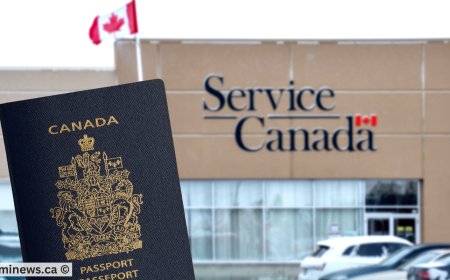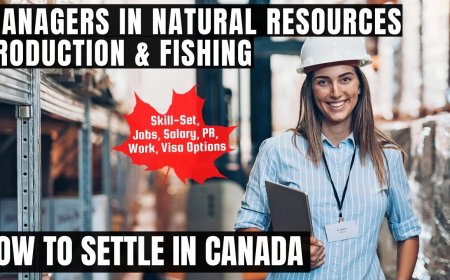Agricultural and fish products inspectors Canada Immigration Pathways: Understanding Salaries, Work Roles, and Best Provinces
Welcome to the pathway to Canada immigration for skilled professionals and trade workers. This guide is specifically tailored for Agricultural and fish products inspectors looking to work and settle in Canada, offering a deep dive into the essential aspects of immigration and employment in this field.
Introduction
Canada has long been known for its rich agricultural and fishing industries, producing some of the highest quality products in the world. As such, the need for Agricultural and fish products inspectors is essential to ensure the safety and quality of these products that are being produced and distributed. In this article, we will delve into the profile of Agricultural and fish products inspectors, covering their main job duties, education and licence requirements, skills needed, median and retirement age, salary details, and possible visa options for those looking to immigrate to Canada for this career. Join us as we explore the exciting opportunities available in this field for those interested in pursuing a career in inspecting agricultural and fish products in Canada.
What is the Profile Description of a Agricultural and fish products inspectors as per the Canadian National Occupation Classification (NOC) Standards?
Agricultural and fish products inspectors are responsible for assessing agricultural and fish products to ensure they meet required production, storage, and transportation standards. They work for government departments, agencies, and private food processing companies to uphold quality and safety regulations. This role may also include overseeing a team of inspectors to ensure thorough and efficient product evaluations.
What are the Main Job Duties of a Agricultural and fish products inspectors in Canada?
- Inspect fish, fish products, fruit, vegetables, grain, and meat to ensure they meet regulations and standards for human consumption.
- Prepare detailed reports on the inspection of agricultural and fish products, including crop production, market conditions, and product quality.
- Monitor operations and practices at fish processing plants, slaughterhouses, and grain terminal elevators to ensure sanitary procedures are followed.
- Certify seed crops, oversee plant quarantine procedures, and inspect plant imports and exports for compliance with plant protection regulations.
- Coordinate with relevant authorities to enforce regulations, conduct inspections, and ensure the safety and quality of agricultural and fish products in the market.
What are the Education, Certifications, and Licensing Requirements to Work as Agricultural and fish products inspectors in Canada?
In order to become an Agricultural and Fish Products Inspector, candidates must have at least a high school diploma. Government inspectors typically need a bachelor's degree or college diploma in fields such as agriculture, biology, chemistry, or food processing technology. Inspectors working outside of government agencies may also need a bachelor's degree or college diploma in a related field. Candidates must also have several years of experience in agricultural production or fish processing. In addition, completing in-house training courses is necessary for this profession.
What Essential Skills are Required for Agricultural and fish products inspectors to succeed in Canada?
To be successful as Agricultural and fish products inspectors, individuals need essential skills such as attention to detail, knowledge of health and safety regulations, ability to interpret government acts and regulations, strong communication skills to explain standards to workers and investigate complaints, as well as the capability to take emergency actions if product safety is compromised. Inspectors must be knowledgeable about diseases, chemical residues, and infestations that can harm products, handle and transport equipment, and ensure sanitary procedures are followed. They also need to be able to certify seed crops, oversee quarantine procedures, examine carcasses for human consumption, and collect samples for microbiological assessment. Overall, a successful Agricultural and fish products inspector requires a combination of technical knowledge, regulatory understanding, communication skills, and the ability to make critical decisions to ensure the health and safety of agricultural and fish products.
What is the Median Age and Retirement Age for Agricultural and fish products inspectors in Canada?
The median age of skilled professionals working as Agricultural and fish products inspectors is 42 years old, indicating that a significant portion of individuals in this field are relatively young. However, the average retirement age for these professionals is 65 years old, suggesting that many individuals in this role choose to work for a significant portion of their adult lives before retiring. This indicates that individuals in this field generally have a long career trajectory, potentially due to the specialized skills and knowledge required for this profession.
How many job openings exist for Other Agricultural and fish products inspectors in Canada, and what's their provincial distribution?
Currently, there are a total of 5 job openings for Agricultural and fish products inspectors in Canada. Among the provinces, Quebec has the highest number of job openings with 3 positions available, followed by British Columbia with 2 openings. Quebec seems to have the highest demand for inspectors in the agricultural and fish products sector, while British Columbia also has some opportunities in this field. Other provinces in Canada have not listed any job openings for this particular profile at the moment. It is interesting to note the disparity in job openings between Quebec and British Columbia, with Quebec having a higher demand for agricultural and fish products inspectors compared to British Columbia.
What is the hourly wage or salary of Agricultural and fish products inspectors in different Provinces of Canada?
Agricultural and fish product inspectors in Canada earn varying wages depending on the province they work in. In British Columbia, the high wage for this profession is $48.23, with a median wage of $37.69 and a low wage of $23.92. Alberta offers slightly higher wages with a high of $49.44, a median of $36.59, and a low of $21.49. Manitoba has a narrower wage range with a high of $38.46, a median of $34.36, and a low of $33.00. Ontario has a wide wage range with a high of $47.68, a median of $34.05, and a low of $16.69. Quebec offers the highest wages with a high of $50.50, a median of $33.97, and a low of $18.25. New Brunswick, Nova Scotia, and Newfoundland and Labrador have similar wages with a high of $41.03, a median of $35.90, and a low of $17.50. Overall, Quebec offers the highest wages for agricultural and fish product inspectors, while Ontario has the widest range of wages across the province.
What are the various visa options available for Agricultural and fish products inspectors migrating to Canada?
Agricultural and fish products inspectors looking to migrate to Canada have several visa options available to them. They can apply under the Express Entry Visa Category, which is a points-based system that considers factors such as age, education, work experience, and language proficiency. Another option is the Provincial Nominee Programs, where different provinces in Canada nominate individuals with specific skills and work experience to apply for permanent residency. Additionally, Agricultural and fish products inspectors may also explore Employer Sponsored Work Visas, where an employer in Canada sponsors their visa application. There may also be other visa options currently open for this profile. To learn more about the visa options available and discuss your eligibility in detail, book an appointment with our professionals today.
Have Questions or Need Assistance?
If you have any queries or require assistance with your immigration plans, we're here to help. Our experienced immigration consultants are ready to provide personalized guidance tailored to your specific needs.
Don't hesitate to reach out and schedule an appointment today. Whether you're seeking clarification on immigration processes, exploring visa options, or need support with documentation, we're dedicated to assisting you every step of the way.
Book an appointment with our team to discuss your immigration goals and receive expert guidance for your journey to Canada.
What's Your Reaction?
 Like
0
Like
0
 Dislike
0
Dislike
0
 Love
0
Love
0
 Funny
0
Funny
0
 Angry
0
Angry
0
 Sad
0
Sad
0
 Wow
0
Wow
0









































































